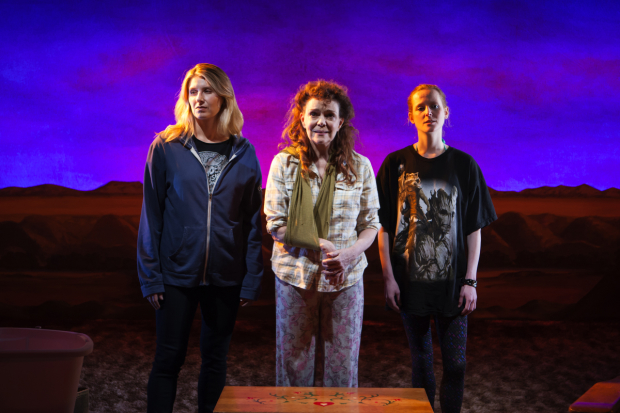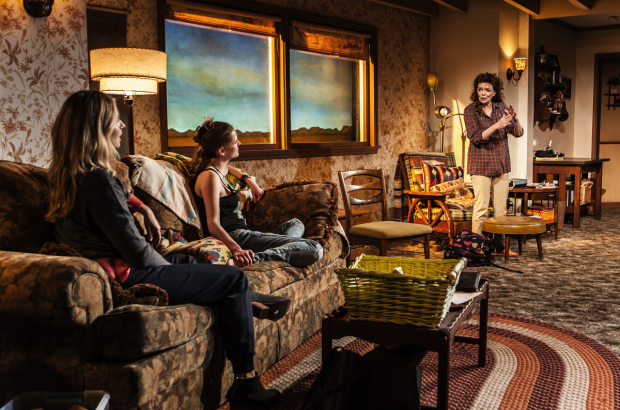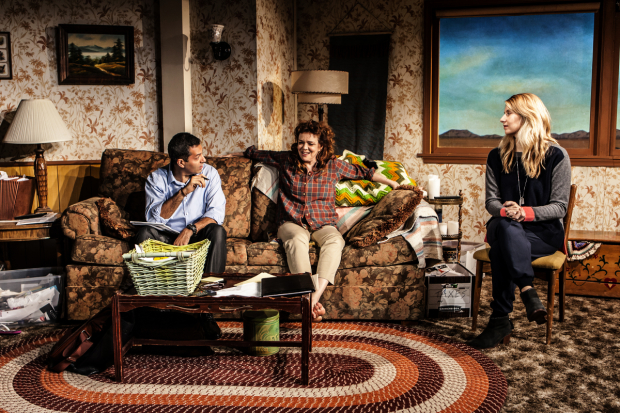The Way West

(© Monique Carboni)
"The frontier has gone, and with its going has closed the first period of American history," wrote historian Frederick Jackson Turner in his 1893 essay "The Significance of the Frontier in American History." For Turner, Americans of that period were marked by "coarseness and strength combined with acuteness and inquisitiveness; that practical, inventive turn of mind, quick to find expedients." We see scant evidence of that ingenuity in Mona Mansour's The Way West (Labyrinth Theater Company at the Bank Street Theater), suggesting that Turner's declaration of a closed frontier may have been a harbinger of the weakening of the American character. With this challenging, important new play, Mansour holds a mirror up to America: where we've been and where we might be going.
Mom (Deirdre O'Connell) is declaring bankruptcy. A toxic combination of generosity and financial illiteracy has landed her in more debt than she can ever hope to pay down. Her daughter Manda (Nadia Bowers) has flown in from Chicago to help sort things out. Little sister Meesh (Anna O'Donoghue) has recently racked up $3,500 in additional credit card debt on mom's name, figuring that it won't really matter after the bankruptcy. On top of that, Mom has invested $11,000 in a shady essential water startup helmed by her friend Tress (Portia). Mom assumes that bankruptcy means she'll get a fresh start, but Manda's ex-boyfriend, Luis (Alfredo Narciso), explains that it is not that simple. She may lose the house, and if a judge finds out that Meesh resold her purchases on eBay, someone could go to jail.
Throughout, Mom tells stories about pioneer days, when brave men and women risked life and limb on the prairie to start a new life out west. Accounting for her financial distress, failing health, and downwardly mobile children, however, the space between reality and mom's rugged western mythology feels as wide as the Grand Canyon. We're not sure her wagon train will make it across.

(© Monique Carboni)
One of the most watchable actors in New York, O'Connell gives a typically memorable performance as Mom, drawing us in with her stories and furtive grin. She seems utterly disinterested in money, handing a big book of financial information over to Manda as soon as she receives it, like it was a hot potato. As the oldest daughter, Bowers appears constantly on edge, making her a slightly oppressive presence. Is it that she is worried about her hapless family, or is it because she is also desperately overleveraged? Bowers delivers a multilayered, relatable performance that resonates in uncomfortable ways.
Scenic designer David Meyer has used the entire expanse of the Bank Street Theater in creating Mom's home, the house at the center of the drama. This bold choice (made more impressive by the fabrication of a realistic house fire) is slightly undermined by the poor sightlines in the space. Wisely, director Mimi O'Donnell stages almost everything in front of a large picture window framed by the theater's massive columns. Through that window, Meyer has created a stunning vista on which lighting designer Bradley King creates the most beautiful sunrises and sunsets. "Look at the light and the hills," Mom exclaims while pointing to purple mountains majesties. "That is what kept them going."
The program describes the setting as "a living room somewhere in California a few months after the last financial crisis" (one would assume around 2008 or 2009); but honestly, it could be right now: For many Americans, the last several decades have been one long financial crisis that only gets worse. We understand that from the chronically unemployed Meesh, and though we would like to sympathize with her, O'Donoghue's exasperating performance gets in the way. She whines and rolls her eyes as if by habit, thirsting for schadenfreude from Manda. "In case you didn't realize, Manda, those aren't money," she taunts her older sister when her credit card is declined. It is far easier than it should be to dismiss Meesh's misfortune as the result of an attitude problem.

(© Monique Carboni)
Then again, the problem may be ours. One gets the sense that Meesh does not desire our pity. More than any other character, she's a fighter, willing to do all sorts of unsavory things to survive. We can see her pioneer spirit alive and kicking when applied to criminal activity, but is that really our final frontier?
You are likely to leave The Way West feeling deeply ambivalent. Mansour does not create particularly likable characters. They are marked by delusion, jealousy, irresponsibility, sloth, and blind faith. Still, few among us can claim to be completely free of those foibles (and if you do, I suggest reexamining the first trait on that list). One should not have to be perfect to have a decent life, and everyone deserves a second chance, even if we can no longer run away to the frontier to find it.











